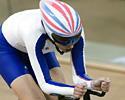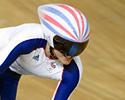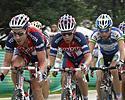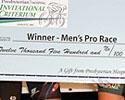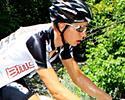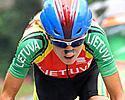First Edition Cycling News, August 18, 2008Edited by Sue George Romero and Houvenaghel continue Britain's Olympic track successBy Rob Jones in Beijing
The third day of track competition saw the Brits continue their dominance on the boards. In the one medal final event - the women's individual pursuit - Great Britain finished one - two, with world champion Rebecca Romero taking the gold and Wendy Houvenaghel the silver. Lesya Kalitovska of the Ukraine won the bronze medal over Alison Shanks of New Zealand. Romero started fast in the 3,000 metre race, and then cruised home to win in 3:28.321, well off Sarah Ulmer's record of 3:24.537, set at the Athens Games four years ago. Her winning margin was just over two seconds, but initially, she didn't realize that she had won, gesturing the question to support staff. Once she realized that she had, indeed, taken the gold medal, Romero pumped her fist and then headed to the rail to be mobbed by her family. "Right now, I'm trying to hold it together; what an immense achievement. I had to search deep inside, and fight for this, and to do what I knew I was capable of," said Romero. "Wendy gave me a challenge all the way. We did it together, we filled the top two spots. Two years ago, we said it would be us two." See Cyclingnews' full coverage of the Olympic women's individual pursuit. World and Olympic track records broken in BeijingBy Rob Jones in Beijing
In the other three events started in Sunday's morning and afternoon sessions - the men's and women's sprint competitions, and the team pursuit, either Olympic or World Records were set, all by British riders. In the flying 200 metre time trials for the sprint qualification, five men and four women all broke the existing Olympic records, with the top qualifiers both within a tenth of a second of the world record. Chris Hoy was the best for the men, with a time of 9.815 seconds, followed by his team-mate Jason Kenny at 9.857 seconds. Theo Bos holds the world record at 9.772 seconds. Stefan Nimke (Germany), Kevin Sireau (France) and Mickael Bourgain (France) also went under the Olympic mark of 10.129 seconds, set by Gary Neiwand of Australia, back in Atlanta in 1996. In the women's 200m time trial, Victoria Pendleton's 10.963 seconds was just outside the world record of 10.831 set by Olga Slyusareva (Russia) back in 1993, and well ahead of the Olympic mark of 11.212 set by Michelle Ferris (Australia), set in 1996. Guo Shuang (China), Anna Meares (Australia) and Willy Kanis (Netherlands) also broke the old Olympic record. Once the racing started, there were a few surprises on the men's side, with defending champion Ryan Bayley (Australia), Nimke and Roberto Chiappa (Italy) all failing to make to Monday's quarter final round. Hoy, Kenny, Bos, Sireau, Bourgain, Teun Mulder (Netherlands), Max Levy (Germany) and Azizulhasni Awang (Malaysia) will contest the quarterfinals. Awang is the only real new name among the remaining riders, and his blazing speed will make him a rider to watch for the future. On the women's side, Pendleton, Guo, Meares, Kanis, Jennie Reed (USA), Clara Sanchez (France), Natalia Tsylinskaya (Belarus) and Simona Krupeckaite (Lithuania) advanced to the quarter finals, also set for Monday. The final event of the day was the qualifying and first round of the team pursuit. In qualifying, Great Britain and New Zealand were the only teams to go under four minutes. But when it came to the first round, with the fastest two going on to race for gold, third and fourth to go for bronze and the rest to go home, the speeds picked up dramatically. All four teams that move on to the medal round caught their opponents. Great Britain smashed the world record of 3:56.322, which they set at the world championships in March, by over a second - 3:55.205 . Denmark qualified second at 3:56.831, followed by New Zealand (3:57.536) and Australia (3:58.633), the defending Olympic champions. Great Britain has said that they will not talk to the media until after the gold medal ride, however, Denmark has all but conceded the title. "We were very nervous," said Danish team member Michael Moerkoev. "Because New Zealand was our biggest competition [for silver]. Great Britain is far away, way ahead." See Cyclingnews' full coverage of the Olympic events. Bayley unsure of cycling futureAustralia's Ryan Bayley came into the Olympic Games in Beijing as the defending sprint and keirin champion, but he did not qualify for the quarter finals in either competition. After struggling at the last two world championships, he indicated he needed a break from the sport. "I am not sure if I want to continue or if I want to do something else," said the Bayley to AFP. "It's difficult when you have done everything there is to do. It's hard sometimes to get yourself up for events. But then again I don't want to leave on such a crappy note, so who knows?" Bayley, 26 years-old, had intended to continue competing until the Olympic Games in London, but now his future is less certain, and he will take a break to reconsider his future. "I need to go back and remember why I enjoyed bike riding in the first place, have some fun with it and be one of the boys," he said. US national racing calendar problems persistBy Mark Zalewski, North American Editor
There are only so many weekends in a year, and even fewer dates with ideal cycling weather for much of the US. So when trying to plan an event, race promoters have a limited window in which to work. Combine that with all of the extra variables promoters have to consider or contend with: city, county and state officials and police; other local events; purchasing and approval of permits; and the headaches grow. Oh yeah, and throw in the 2,500 other cycling events trying to fit together and the challenges grow exponentially. At the top of the list are a select group of races that go further and bid to become part of the USA Cycling National Racing Calendar (NRC). With the bid process for the 2009 season underway, Cyclingnews' looks at what is working and what is not. In theory the NRC status should give an event stature and recognition as the top event on a given date, and thus should garner a majority of teams and riders from around the country. To get NRC status, a race needs to jump through many additional hoops, such as meeting prize money minimums (raised for 2008,) ensure quality infrastructure and show a proven track record of running high-end events. However, for many promoters the system just is not working as intended, with events crossing paths and cancelling each other out, as well as little in terms of specialized support from USA Cycling. Such was the case recently with the Presbyterian Health Care Invitational in Charlotte, North Carolina and the Tour of Elk Grove near Chicago, both on the same weekend. While the Charlotte race had the NRC status the Tour of Elk Grove did not, due to a paperwork error last fall. As such it was run in the same category a plain-as-vanilla parking lot criterium – albeit the world's richest parking lot criterium. The two races featured the richest prize purses of the year, with Charlotte at US$100,000 and Elk Grove at $275,000, making it the richest three-stage race in the world. While the US domestic scene has evolved to the point where most of the men's peloton can split its talent across two events, having nearly $400,000 of prize money on one weekend was to many a poor allocation of resources. "It's unfair to the athletes too because this taken off a huge payday for them," said Thad Fischer, director of the Charlotte race. "They need that potential income." As well, the entire field in Elk Grove (though limited to pro teams only) was only 63 riders – hardly worthy of the six-figure prize list on offer. USA Cycling's man in charge of the NRC, Justin Rogers, said that problems like this are being addressed, particularly with a major fix to the bid process. "The most prevalent one is that [the bid application] is out earlier," he said. "Previously we followed the model of the UCI and gave promoters 30 days to submit their information. That doesn't give them a lot of time to get everything together so we've moved the process farther out to July 15 until September 15. We then hope to announce the calendar around Interbike." Rogers said that the narrow window was part of the reason for the Charlotte/Elk Grove debacle. "Last year when the bid process took place, we received a bid from the Charlotte criterium but nothing from Elk Grove. At that point we moved forward with the calendar. Then we were notified that Elk Grove was on the same date and there were a number of conversations with the promoters to work out a solution. Both had their dates secured and had to move forward. So we were stuck with a weekend of nearly $400,000 of prize money. It's not ideal and would love to see those events move off each other, but it's scheduling."
Again the variables in race promoting reared their ugly heads. Both Charlotte and Elk Grove said that weekend was the only weekend on which they could hold their races – Charlotte because the coveted city center location was booked every other weekend and Elk Grove because they were adding a road stage and a nearby major event would have made it impossible on the previous date, a week later than the two years before. Unfortunately, the date move by Elk Grove was not communicated. "We applied for the date that we needed and didn't hear back from USAC," said Fischer. "We assumed everything was fine and when the schedule was released we had our date. But we did not see Elk Grove listed and I made a few calls and found out it was on our date. I called the guys in Chicago and they said they were in the same boat and said they did not know we were on that date. Our situation is that we have this date or no date, because [the location] is booked every weekend." "USAC's response is that they are not an NRC event and that it isn't a conflict with you," Fischer continued. "I responded with that we are all using the same athlete pool. We are a six-figure event and having to share the athletes with another six-figure event." Read the complete feature.
Louder takes Utah by one-secondBy Kirsten Robbins is Salt Lake City, Utah
The man of the day at the Tour of Utah was Jeff Louder, who started the final stage's time trial seven seconds behind Blake Caldwell (Garmin-Chipotle). He made up eight seconds in the short time trial to take the overall victory of the Tour of Utah by just one second. Glen Chadwick (Team Type 1) maintained his third place overall. "It was a huge team effort this week," said Louder who moved closer to his winning goal when he took the previous stage four victory atop Snowbird pass. "These are my people, my roads and my conditions. My Dad was in the follow car, my wife Soorya and baby Milana are here. So, to be able to win this in front of them – I will relish." Tom Zirbel (Bissell) proved to be on grand form when he blasted to a win in the final 12-kilometre time trial with the best time of 13'05". Zirbel bested the BMC pair - nine seconds ahead of Brent Bookwalter and 15 second ahead of the overall race winner Louder. "I feel really good right now and my time trialling is where it needs to be," said Zirbel who has his eyes set on the USPro time trial championships to be held in Greenville, South Carolina. "Winning today doesn't surprise me," said Zirbel. "I'm feeling good in the time trials and also I got to sit up at the base of the climb yesterday. You never know how the other guys might have been feeling after that stage." See Cyclingnews' full coverage of the Tour of Utah. Pucinskaite reflects on her Olympics
Edita Pucinskaite reflected on her Olympic experience after a long journey home from China. Pucinskaite, who is from Lithuania, finished ninth in the road race and 23rd in the time trial. "Ninth place in the Olympics is a major achievement that reconfirms that I am one of the strongest athletes in the world, but the problem for me, as with any athlete, is that I regret when I can't give my best," she said. "Everything could have been different, more beautiful, and instead, this is not the case." Pucinskaite crashed hard in the women's World Cup in Sweden on July 30. She injured her shoulder, obtaining a large haematoma, and said the pain is still not gone today. "I can still not drink from a bottle with my right arm, and I can't pull on my arm when sprinting or climbing hard," she said. "In the coming days, I will have to go to the hospital for further checks." Pucinskaite didn't attribute her performance solely to effects of the crash, but said another problem was the rain and the subsequent drop of temperature by 15 degrees. She is already thinking about what is left for her this season. "A lot will depend on the condition of my shoulder. I want to concentrate on the Tour of Tuscany and the Worlds in Varese." "Who knows, perhaps I have had my share of bad luck and the sun will shine on me now?" she speculated. Health permitting, she will next head to the World Cup in Plouay, France, on August 24; the World Cup in Nurnberger, Germany, on September 14 and the World Championships in Varese, Italy, on September 30. Terpstra out with two broken armsNiki Terpstra of the Netherlands was cycling with his team-mates to the Laoshan Velodrome Sunday morning for the qualifications for the team pursuit. In front of Terpstra, Robert Slippens suddenly had to dodge a car, and Terpstra ended up going down into the Beijing traffic. He suffered fractures of both lower arms. The 24 year-old was immediately taken to a local hospital, where the fractures were diagnosed. He also had stitches in an open wound on his chin. "This is very bitter for Niki. The Olympics are a dream for every athlete," said Milram team manager Gerry van Gerwen. "He has had a very successful season so far and was scheduled to start the Deutschland Tour. Now we have lost him for the rest of the season. We wish him the best and hoped that he recovers from his injuries quickly." Terpstra had signed a new two-year contract with the team at the end of the Tour de France. (Additional editorial assistance provided by Susan Westemeyer.) (All rights reserved/Copyright Future Publishing (Overseas) Limited 2008) |

|
January 2009 |
Recently on Cyclingnews.com |

